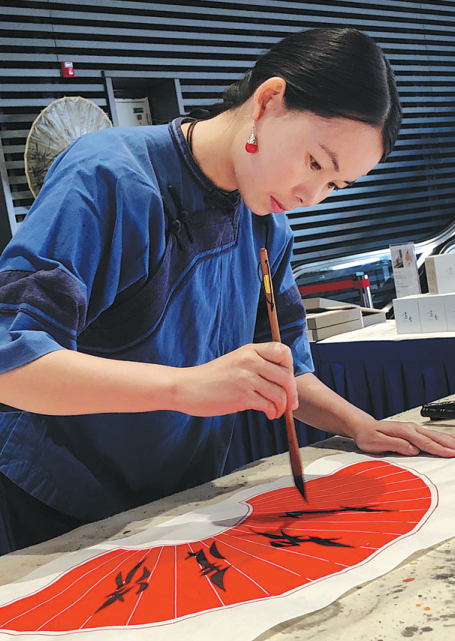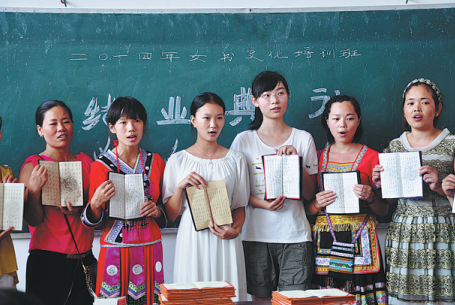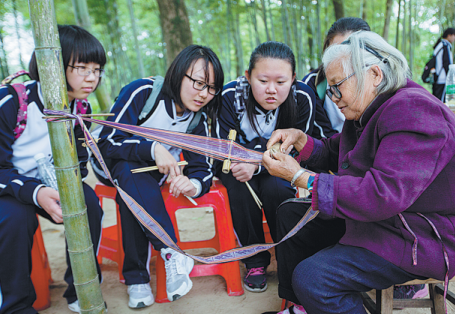Secret script an act of female independence
Covert women's writing method in underdeveloped county in Hunan province kept men out of the loop for centuries

For hundreds of years, Chinese women fought for the right to be heard as their voices were often neglected or silenced in male-dominated societies.
In Jiangyong, a remote, less-developed county in Hunan province, nvshu, a Chinese syllabic script exclusively for the use of women, was invented hundreds of years ago.
The world's only gender-based script, nvshu features a square-shaped font and slender strokes that form the shape of ants. In the past, nvshu messages were often written on pieces of paper, fans or handkerchiefs to secretly convey information to other women.
Traditionally, the social status of women in the county was low. They were required to stay at home, take care of the elderly and children and show obedience to their husbands. Social exchanges outside the family were rare, few women had the chance to attend school and many were illiterate.
"When they were not allowed to learn how to read and write, they invented a script of their own to record their thoughts and feelings in a written form. Such bravery and wisdom is remarkable," said Peng Zerun, a linguistics professor at Hunan Normal University in Changsha, Hunan.
Nvshu is a phonetic script that records local dialect. There are only about 700 characters in nvshu, which represent multiple meanings. In contrast, Mandarin learners need to comprehend more than 10,000 characters to fully express themselves. "So nvshu is more convenient," Peng said.
He added most of the nvshu writings take the form of poems, with standardized lines and meter.
To keep their script a secret from men, it was covertly passed between generations of women via song, embroidered on cloth or via pieces of paper clandestinely circulated. For their part, men weren't overly suspicious and thought the women were doing arts and craft or other activities.
Most nvshu works were closely related to women's lives, covering issues such as marriage and family life, labor, social interaction, culture and entertainment, customs, religious beliefs and morality. They also dealt with emotions such as happiness, anger and grief.
A renowned Jiangyong nvshu work, written by Yi Nianhua (1907-1991) tells the story of a young woman, Yulian, who was saved by a young man after being attacked by robbers on the night of the Lantern Festival. He left without giving her his name, and Yulian became lovesick.
Another work tells the story of a woman who fled to her nephew's home after being beaten by her husband, while another account tells the sad tale of a woman who drowned herself after being abandoned by her spouse.
Important local events were also recorded, such as anecdotes about the Taiping soldiers, who passed by Jiangyong, involved in the unsuccessful rebellion (1850-1864) against the rule of the Qing Dynasty (1644-1911). Some accounts are autobiographies.
Sisterhood
Nvshu is an important communication tool in laotong, a relationship between two women of similar age in Jiangyong. After they swear to be sisters, a close lifelong bond is formed and the women exchange views and do needlework and nvshu artwork together.
In the film The Snow Flower and the Secret Fan (2013), which tells the story of nvshu and laotong, a wise aunt says: "Marriages used to be made for men's reasons-to form business alliances, to manage households and to produce sons. And they were obligatory. But laotong's commitment was for women's reasons, by choice-for companionship, understanding and happiness."
In the film, the two heroines exchanged folding fans carrying nvshu messages; they have a nodding acquaintance, but do not meet in person for years.
"Nvshu reflects feminist consciousness among women in old times," Peng said. "In a feudal society where men were considered superior to women and women were oppressed, local women showed an unyielding spirit toward life. They yearned for equality, at least in the sector of culture, by inheriting their feelings and knowledge with their own words. Such perseverance is inspiring."
Edge of extinction
Although it has existed for hundreds of years in the 1,540-square-kilometer county, nvshu only became known to the public in the 1980s, and soon made a stir worldwide. In 2005, it was accepted into the Guinness World Records and the next year it was listed by China as an intangible cultural heritage.
Nvshu works are rare. The oldest remaining ones are from the Ming Dynasty (1368-1644), because the custom was to burn all nvshu works of the writer after she died. Now, there are only seven inheritors of nvshu recognized by the government.
Hu Xin, 33, is one of them. She has learned nvshu since 2000 and because she knows the local dialect, learning it was easy for her.
She said nvshu and its associated culture can be accepted in modern times. Composer Tan Dun created a symphony based on the script and the performance was welcomed in over 30 countries, she added.
While Hu said the script has few practical applications nowadays, the local government has made efforts to protect the cultural heritage.
Four villages in Jiangyong have been delegated as nvshu protected zones, where traditional architecture and natural landscapes have been restored. Old local customs related to nvshu are practiced in the villages, according to the local government.
The nvshu museum welcomes more than 200,000 visitors a year. In 2013, a nvshu school was founded inside the museum. It has classes every summer vacation and cultural inheritors give lessons at schools and colleges, Hu said.
He Xiuhui, a 52-year-old Chinese-language teacher at a middle school in Jiangyong, attended a training program in 2019 and now teaches the script to her students.
"Many students like it, both female and male. Although it used to be a secret language for women, boys think it is part of our culture and they are interested," He said.
Peng said he visited Jiangyong in recent years, and noticed all signboards along the street were in the script, which created a special atmosphere. He added nvshu's complex, delicate font can be a good design element for cultural and creative products, such as clothes and bags.
The local government plans to train more inheritors and develop rural tourism and cultural works such as paintings, music, dance, television and films to spread awareness about the script and realize its social and economic value.
Zhu Youfang in Changsha contributed to this story.



Today's Top News
- Xi urges studying, absorbing netizens' opinions in formulating 15th Five-Year Plan
- Yuan eyes greater role among safe-haven assets
- China set to clean up online health content
- China, EU can shape climate governance
- Chengdu gearing up for World Games
- Beijing, Kathmandu aim for new heights in relations






























